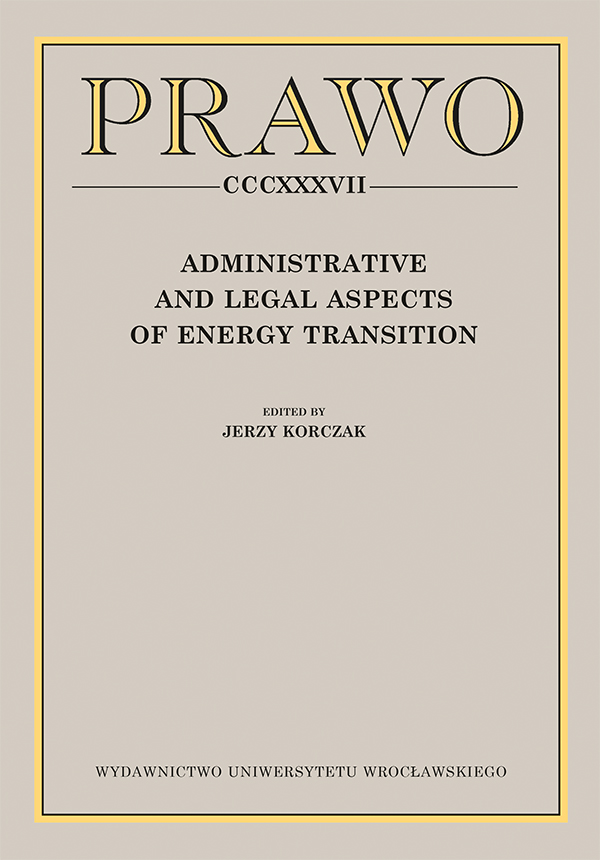

Artykuły

The article focuses on the question of networking of legal and organizational solutions in the energy transition process, which accepts energy collectives. Energy collectives take on two fundamental forms in the Polish legal order: energy clusters and energy cooperatives. The article presents a description of these two basic legal and organizational mechanisms of energy transition and identifies the main indicators making it possible to compare them to each other. The paper uses the method of content analysis of legal regulations (EU and national) and specialised literature on the subject.
Achrol R.S., Gundlach G.T., “Legal and social safeguards against opportunism in exchange,” Journal of Retailing 75, 1999, no. 77, pp. 107–124.
Barnes J.A., “class and committees in a Norwegian Island parish,” Human Relations 7, 1954, no. 1, pp. 39–58.
Bielski M., Formalna i rzeczywista struktura organizacyjna, Warszawa 2003.
Chrisidu-Budnik A., Od biurokracji do New Public Governance. Perspektywa izomorfizmu instytucjonalnego, Wrocław 2019.
Deutsch M., “A theory of cooperation and competition,” Human Relations 2, 1949, no. 2, pp. 129–152.
Gordon D.J., “Between local innovation and global impact: Cities, networks, and the governance of climate change,” Canadian Foreign Policy Journal 19, 2013, no. 3, pp. 288–307.
Gordon D.J., “The orchestration of global urban climate governance: conducting power in the post-Paris climate regime,” Environmental Politics 26, 2017, no. 4, pp. 694–714.
Graczyk A., “Pojęcie ekologicznych kosztów zewnętrznych,” Ekonomia i Środowisko 26, 2004, no. 2, pp. 7–29.
Gronkowska J., “Polityka wsparcia tworzenia i rozwoju klastrów energii w Polsce,” Zeszyty Naukowe Instytutu Gospodarki Surowcami Mineralnymi i Energią Polskiej Akademii Nauk 2017, no. 97, pp. 216–230.
Huybrechts B., Haugh H., “The roles of networks in institutionalizing new hybrid organizational forms: Insights from the European renewable energy cooperative network,” Organization Studies 39, 2018, no. 8, pp. 1085–1108.
Ingold C., Fischer M., “Drivers of collaboration to mitigate climate change: An illustration of Swiss climate policy over 15 years,” Global Environmental Change 24, 2014, no. 1, pp. 88–98.
Li J.J., Poppo L., Zhou K.Z., “Relational mechanisms, formal contracts, and local knowledge acquisition by international subsidiaries,” Strategic Management Journal 31, 2010, no. 4, pp. 349–370.
Li Y., Peng M.W., “Formal control and social control in domestic and international buyer–supplier relationships,” Journal of Operations Management 28, 2010, no. 4, pp. 333–344.
Łolik M., Współczesne prawo kontraktów – wybrane zagadnienia, Warszawa 2014.
Long N., Krause R.M., “Managing policy‐making in the local climate governance landscape: The role of network administrative organizations and member cities,” Public Administration 99, 2021, no. 1, pp. 23–39.
Marshall A., Zasady ekonomiki, Warszawa 1925.
Moore J.F., The Death of Competition: Leadership and Strategy in the Age of Business Ecosystems, New York 1996.
Mucha-Kuś K., Sołtysik M., Zamasz K., “Rola koopetycji w klastrach energii,” Zeszyty Naukowe Wydziału Elektrotechniki i Automatyki Politechniki Gdańskiej 2017, no. 53, pp. 31–34.
Naisbitt J., Megatrendy, Poznań 1997.
Niemczyk J., Strategia. Od planu do sieci, Wrocław 2013.
Peltoniemi M., Vuori E., “Business ecosystem as a tool for the conceptualization of the external diversity of an organization,” [in:] Proceedings of the Complexity & Science and Society Conference, 2005, Liverpool 2005, pp. 1–8.
Ryall M.d., Sampson R.C., “Formal contracts in the presence of relational enforcement mechanisms: evidence from technology development projects,” Management Science 55, 2009, no. 6, pp. 906–925.
Sun-Jin Y., “Climate policy networks in South Korea: Alliances and conflicts,” Climate Policy 14, 2014, no. 2, pp. 283–301.
Vandaele D., Rangarajan D., Gemmel P., Lievens A., “How to govern business services exchanges: `contractual and relational issues,” Journal of Management Review 9, 2007, no. 3, pp. 237–258.
Wilkinson-Ryan T., “Transferring trust: Reciprocity norms and assignment of contract,” Journal of Empirical Legal Studies 9, 2012, no. 3, pp. 511–535.
Ylä-Anttila T., Gronow A., Stoddart M., Broadbent J., Schneider V., Tindall D., “Climate change policy networks: Why and how to compare them across countries,” Energy Research & Social Science 45, 2018, pp. 258–265.